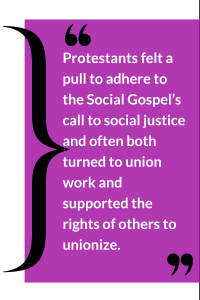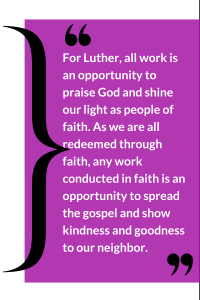By Emily Ahern, ELCA Hunger Advocacy Fellow [About the Author]
On May 1st, many observed the public holiday May Day, otherwise known as International Workers’ Day. This day is set aside specifically to commemorate working class people and to shed light on the demands made by people involved in the labor movement. Christians have intertwined with this movement, historically and today, and Lutheran teaching shapes our point of view.
A HISTORICAL PERSPECTIVE
May 1 was specifically chosen to commemorate the strike which would culminate in the Haymarket Riot, a clash between labor protesters and police on May 4, 1886 which led to the deaths of at least eight people and brought increased attention to the American labor movement. 
From the turn of the 19th century up until the Great Depression, labor organizers found allies in religious Americans, particularly those of Protestant affiliation. An influx of Protestant immigrants saw workers entering the “craft” trades (supported both by what is known as the Social Gospel and the Protestant Work Ethic). With significant representation in the largest group of unions in the country, the American Federation of Labor (AFL) (the largest group of unions in the country), Protestants felt a pull to adhere to the Social Gospel’s call to social justice and often both turned to union work and supported the rights of others to unionize.
The Great Depression saw the integration of many religious, racial and ethnic groups in union spaces. The Congress of Industrial Organizations (CIO), which first broke away from the AFL due to disagreements over their belief in the organization of all industries (craft and non-craft alike), reintegrated with the AFL after its leadership was ousted in droves due to allegations of communist affiliation. Together, the AFL and the CIO formed what is now known as the AFL-CIO, and those who were once part of the CIO took to organizing laborers in non-craft trades, who were often Catholic or Jewish, in droves. Soon, the labor movement became a monolith composed of different identity groups – racial barriers began to be broken down, and workers of a number of faith traditions worked together on issues related to workers’ rights.
LUTHERAN SHAPING OF VIEW ON LABOR
In my reflection, I think it is in our marrow to work. Genesis 2:15 says that humankind was placed in the Garden of Eden to work it and keep it. Perhaps most importantly, Colossians 3:23-24 says that “Whatever task you must do, work as if your soul depends on it, as for the Lord and not for humans, since you know that from the Lord you will receive the inheritance as your reward; you serve the Lord Christ.” Our Christian tradition teaches the inherent dignity of all human beings, as we are made in the image of God. Our work can express this dignity; however, work is not all that we are as humans.1 
With this understanding of human dignity, it is essential that employers treat their workers with respect. This includes being compensated fairly, given good benefits and treated fairly. The ELCA social statement on Economic Life calls us as a church to “commit ourselves to… cultivate participatory workplaces, support the right of employees to organize for the sake of better working conditions and to engage in collective bargaining, and refrain from intentionally undercutting union organizing activities, or from permanently replacing striking workers” (p. 10).
This idea goes back to Martin Luther’s original understanding of vocation. He made clear that all vocations – from working in farms to working as a minister – please God. For Luther, all work is an opportunity to praise God and shine our light as people of faith. As we are all redeemed through faith, any work conducted in faith is an opportunity to spread the gospel and show kindness and goodness to our neighbor. Martin Luther’s radical understanding of vocation and its foundations in Colossians shape our Lutheran attitude toward labor today. No form of labor is above another – therefore, we are called to support each other in our vocations, including supporting the rights of all workers, union or nonunion, high-wage or low-wage.
CURRENT STATE OF AFFAIRS
Today, the dignity of work experiences new challenges that should concern us as Christians and workers across the United States. Recently, the National Labor Relations Board, the quasi-judicial body which litigates labor disputes and investigates companies and corporations alleged violations of labor law, has been functionally frozen. In an Executive Order, the White House asked the Department of Labor (DOL) to halt all workplace discrimination investigations. Meanwhile, policymakers are also considering cutting essential programs such as the Occupational Safety and Health Administration (OSHA) which ensures workplace safety standards. In another Executive Order, the President restricted or eliminated employment protections for workers in numerous federal agencies. These agencies– including the Department of Health and Human Services and the Food and Drug Administration–were questionably declared “to have as a primary function intelligence, counterintelligence, investigative, or national security work,” and therefore were rendered ineligible for these labor protections. As Christians with a history of upholding the whole needs of the human person, including essential elements of work, these developments should concern us.
CALL TO REFLECTION TODAY
Labor in the United States would not be nearly as strong, nearly as effective, or nearly as safe without people of faith. As we as Lutherans reflect on our commitment to work and human dignity, I encourage us to reflect as Lutherans on our commitment to work and human dignity not just historically but also today.
1 See also the ELCA social statement Sufficient, Sustainable Livelihood for All: “Although our identity does not depend on what we do, through our work we should be able to express this God-given dignity as persons of integrity, worth, and meaning. Yet work does not constitute the whole of our life” (p. 9).
ABOUT THE AUTHOR: Emily Ahern (she/her) is the Hunger Advocacy Fellow – Federal Policy with ELCA Advocacy. She is originally from Allentown, Pennsylvania, and a lifelong member of congregations of the ELCA. She graduated from American University this past spring with a degree in Political Science, and graduated (once again) from American University this May with a Master’s in Public Administration. Ahern is so excited to research and advocate for policy which will alleviate the effects of hunger and poverty for all Americans! In her free time, she can be found collecting vinyl, going to concerts and watching Star Wars.
